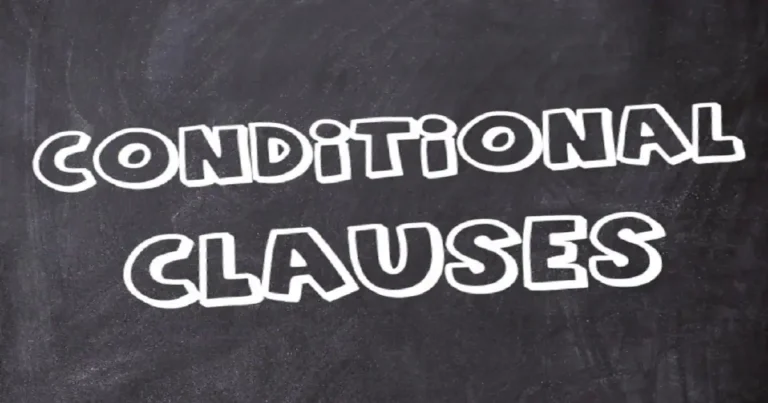CONDITIONAL CLAUSE
Conditional clauses are a type of adverbial clauses. The event/situation described in the main clause depends on the condition in the subordinate clause.
– If it rains(condition) we will get wet.(main clause)
– We will get wet(main clause) if it rains.(condition)
The most common conjunction used in conditional clauses is if (in fact, conditional clauses are also called if-clauses). However, there are other conjunctions too that are used in conditional clauses. They are: unless (= if…not), provided (that) (= only if), so long as or as long as, on condition that, suppose, supposing, in case etc.
– He will fail unless he studies harder.
– Suppose there are no tickets available, what shall we do?
– I’ll come with you provided that you drive.
THE PRESENT CONDITION or ZERO CONDITION
If + present simple + present simple
– If you heat butter, it melts.
– When you heat butter, it melts. (This always happens)
– If a motorist sees a red light, he stops.
– When a motorist sees a red light, he stops. (a general rule)
In these type of clauses if almost means when or whenever.
THE WILL CONDITION or FIRST CONDITIONAL
If + present simple + will/won’t
– If I drop this cup, it will break.
– If you touch a live wire, you will get a shock.
The will condition predicts a likely result in the future if the condition is fulfilled.
* Along with will, we can use other modal verbs in the first conditional.
– If we miss the train, we can go by bus.
– If you call him now, he might be in a meeting.
* Often in spoken English we drop the if+pronoun
– Touch my mike and I will kill you.
THE WOULD CONDITION or SECOND CONDITIONAL
If + past simple + ‘d/would
– If I had lots of money, I would go to South America.
– If I knew the answer, I’d tell you.
The would condition imagines the present or future to be different.
The were construction is also used in the would condition. Were does change with person/number.
– If I were a bird, I’d fly to America.
– If I were more sensitive, he’d make a better husband.
THE WOULD HAVE CONDITION or THIRD CONDITIONAL
If + past perfect + ‘d/would have + past participle
– If the wheel hadn’t been invented, the world would have been different.
– If the boy had been careful while crossing the road, he would not have been knocked down by the car.
The would have condition or third conditional is used to express the impossible, i.e. something that did not happen. It is called the impossible conditional because the past cannot be changed.
As this conditional talks about something that could have happened but did not happen, it is also called the regret clause.
– If I had studied harder, I would have got a first class.
– If he hadn’t listened to bad advice, he wouldn’t have lost all his money.
OTHER FORMS OF THE CONDITIONAL
1. If + present simple + imperative
– If you are bored, please leave the room.
2. If + future simple + future simple
We make polite offers using this structure
– If you’ll come this way, the manager will see you now.
We can also make threats using this structure.
– If you won’t listen, there’ll be trouble.
3. If + past simple + past simple
– If the king wanted something, he just took it.
4. If + past simple + present simple
Here the condition is expressed by if + past simple (= if it is true); the result in simple present.
– If you submitted you assignment, where is it?
– If Roy gave the man money, he’s stupider than I thought.
FUNCTIONS OF CONDITIONALS
1. Giving advice: We use the If I were you…. construction to give polite advice.
– If I were you, I’d accept the offer.
2. Making suggestions: We use the past tense + conditional structure to make more polite/tentative suggestions.
– It would be great if you helped me with my project.
3. Making requests:
– I’d be grateful if you could give me a testimony.
– If you would come this way please, the doctor will see you.
4. Giving orders: Here we use should with if and an imperative.
– If you should see Robert, tell him to come to my office.
